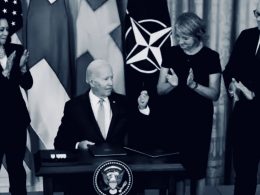When Michael Parenti polemicized against what he called the “anything but class” left, he was describing a pattern of thinking that communists will need to expunge from our movement in order to defeat the state. This is the impulse to emphasize the differences between the workers, more than the things that unite the workers. To focus so much on the distinctions between white workers, black workers, Native workers, “professional managerial class” workers (which some now foolishly include service workers in the definition of), and so on that the rhetoric of these ABC leftists has the effect of making a unified workers movement less attainable.
I say “the effect” and not “the intent” because within radical spaces, the idealistic actors who put forth this rhetoric believe they’re doing the most revolutionary thing possible by emphasizing race or other identitarian distinctions so hard. When confronted on how their practice hinders proletarian unity, I’ve seen them fall back on the idea that they still seek to unite the workers. The problem is that as long as they continue their present model of practice, they won’t be able to actually show the workers why they must unite. They won’t be able to offer a serious labor movement, only a social media feed of condemnations against the moral character of the people.
And I’m talking about not only the white workers, but the ones of all colors and relationships to settler-colonialism. As even though the proletarians from the Native and African diaspora communities are the ones the ABC left seeks to reach out to, that the ABC left treats these demographics like the only ones with revolutionary potential means this left won’t be able to build an effective workers movement. A movement that’s capable of establishing strong ties to the broad category of proletarians, including the proletarians who’ve been victims of colonialism. The ABC left ironically hinders the liberation efforts of the peoples it claims to represent.
This practice is ineffective because it rejects the idea of majoritarianism, and by extension the idea of a popular front. Both of which are crucial for the success of a workers revolution. Unless you’re in a place like Israel, where the predominant population gets massive benefits from colonial theft and inhabits a tiny geographical space, as a communist it’s indispensable for you to be a majoritarian. The conditions of the United States are distinct from Israel’s in that the U.S. is a settler state so massive, its internal population is mostly compatible with revolutionary politics. It for the most part can’t keep nonwhites from existing within its borders, to the effect that whites will soon no longer be in the majority. And its white population has long included a large proportion of impoverished people, people who don’t have an equivalent among Israel’s settlers.
Even if the whites of rural Appalachia and other destitute places can still be called “settlers,” that term is absurdly reductive when applied to them without any additional context. This context is that the USA built an industrial economy so vast, enormous sections of its own citizens needed to be forced to the economy’s margins so profits could be kept up. And plenty of these people the ruling class has discarded are descendants of the same European immigrants who the empire initially used to build itself up.
That these immigrants had the ability to assimilate into the “white” family, and become immune from racism, is one of the tools the ruling class has used to reinforce its power. The U.S. empire has survived so long by cultivating a social base of labor aristocrats who aren’t subject to the struggles of the actual working class, and this labor aristocracy has naturally been for the most part white. What the ABC left does is assist the ruling class in this tactic of preventing revolution via the elevation of a favored demographic. By emphasizing the ways the material interests of whites differ from those of other demographics, without accounting for the experiences of class exploitation which workers of all colors can relate to, they act like these interests give the white workers a primary material reason for betraying the revolution. When truly it’s the other way around: all proletarians by definition have a primary interest in proletarian revolution, which inextricably involves the decolonization of the United States. And because there are far more proletarians than labor aristocrats in the United States, to act like most Americans are labor aristocrats is to obstruct the revolutionary struggle.
The effect these ideas have on white radicals is ironically one which gives them the mentality of white saviorism. Because these radicals see themselves as the exceptional whites, the ones who’ve figured out special knowledge about the world that the other whites aren’t capable of ever absorbing, they come to view revolution as something that can be achieved through essentially magical means. The route to victory, so claims this ideological strain, doesn’t run through efforts to connect with the people on the systemic injustices that impact them. It involves condemning the majority for not embracing the esoteric theoretical brand from within one’s own insular online discourse circle. The brands I speak of are esoteric not because their ideas are necessarily incorrect, but because the way their arbiters operate keeps them alienated from the majority. We can bring education about tribal sovereignty, New Afrika, and other important pieces of liberation theory to the people, yet only if we do so by connecting with the people on the issues they have an immediate practical incentive to be concerned about. Otherwise there’s going to be a fundamental gap in self-awareness that hinders communication with the uninitiated.
When one’s practice is based in this moralistic mentality, rather than in the analytical mentality that Marxists must have, the impact their practice has is not beneficial to the revolutionary cause. That’s why Parenti warned us about the anything but class mentality: it nurtures an impulse among the workers who’ve absorbed it to find reasons for fighting among themselves, as opposed to building the proletarian movement. The difference between serious Marxist-Leninist theory, and the theory offered by the left deviationists, is that Marxism-Leninism is actually capable of speaking to the people on the issues that are relevant to their lives.
The good news is that there are relatively few workers who actually embrace those anti-revolutionary types of theory. The ones who overwhelmingly absorb it, and who are most vocal about promoting it, are those in the “privileged minority” that Lenin identified as the opportunistic element within the left. This is the same element that Lenin named as the “defenders of the fatherland,” the political actors who will ally with their imperialist government when it comes to the wars this government wages. We see the equivalent pattern within the element of the modern American left that’s more interested in finding reasons to condemn the USA’s people than in doing what’s necessary for the revolution.
What’s necessary for the revolution can be found within a serious analysis of our conditions amid this proxy war. The war, along with the Fed, have exacerbated inflation to the point where almost two-thirds of Americans are living paycheck to paycheck. In response, the most advanced segment of the workers, the ones with an anti-imperialist consciousness, have been building an anti-NATO movement. That this movement hasn’t exclusively been on the left is seen as offensive by the ABC leftists. But having a multi-tendency antiwar coalition is a healthy thing. It represents the expansion of the class struggle—which is intertwined with the anti-imperialist struggle—beyond the spaces where people are already involved in activism and discourse. Because it’s these spaces that the left’s opportunists depend on to maintain their status, for the anti-NATO movement to disrupt their ability to gatekeep these spaces makes this movement a threat towards this status.
Naturally, these elements are attacking the anti-NATO movement, as seen in the “socialist” or “progressive” publications that have been defending NATO, its expansion, and the fascist Ukraine coup which Washington carried out in conjunction with that expansion. With these pro-imperialist arguments have come bad-faith attacks against Rage Against the War Machine and the coalition it’s produced, attacks based in a desire to defend the pro-NATO stance. Their goal is to make those who identify as on the left loyal towards an idea set that’s in effect supportive of U.S. hegemony. Which is the key thing to pay attention to: the impacts of the things they do, as opposed to what they say they want to do.
If pressed, these actors would no doubt deny being pro-imperialist. Yet when somebody consistently puts forth ideas that hinder revolutionary progress, attacks the most advanced elements among the workers for their revolutionary stances, seeks to discredit the most radical projects for resisting imperialism, and doesn’t change their way of operating when confronted, what can we conclude about them other than that they’re on the side of the empire?
————————————————————————
If you appreciate my work, I hope you become a one-time or regular donor to my Patreon account. Like most of us, I’m feeling the economic pinch during late-stage capitalism, and I need money to keep fighting for a new system that works for all of us. Go to my Patreon here.








